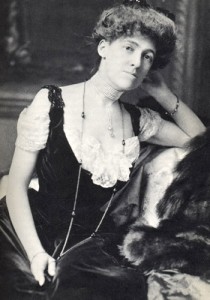A Soft Captivity:
The Age of Innocence

‘And, in spite of the cosmopolitan views on which he prided himself, he thanked heaven that he was a New Yorker, and about to ally himself with one of his own kind.’
One of his own kind… This concept is important to most of the characters in Edith Wharton’s wonderful, elegiac and – in the final analysis – moving and quietly ambiguous 1920 novel, The Age of Innocence.
It is set during two unspecified years in the New York of the early 1870s, with a final haunting chapter taking place a quarter of a century later. The milieu is the rigid social scene of the aristocracy, determinedly surrounding itself with European objects whilst staying strictly apart from anything too foreign or which will fly in the face of the unspoken, ‘intricate and fascinating’ idea of ‘Good Form’.
Newland Archer (like the book’s title, ironically named), the wealthy young man who practices law simply in order to have something to do, is contemplating with a languid complacency his coming marriage to the very proper May Welland. His cozy and ordered world and world view is about to shaken, however, by the arrival of May’s cousin, the Countess Ellen Olenska.
There is an immediate attraction between Newland and Ellen; but bowing to the stifling rules of the society in which they move, everything is played out with agonizing slowness and a deep wish on all sides to do the correct thing and ensure that there are no injured or slighted parties.
This, of course, is an impossibility.
Ellen Olenska is fleeing from an abusive marriage to a ‘foreigner’ and seen by all as socially risky. She is certainly in no danger of being accepted until a benign and subtle blessing has been given by New York’s leading family lights, Mr. and Mrs. van der Luyden. Perhaps because of this build-up I had expected her to be along the lines of the conventional idea of the rebellious free spirit. As the novel went on, though, I began to look at her more as someone that things simply happened to, with others being caught in her slipstream. And May, whom I had originally pictured as something of what would today be considered an airhead, turns out to be an instinctively strategic fighter. In this she is backed up at all times by the tribal affiliations of not only her immediate family but the New York set in general.
It is the initially assertive and competent-seeming Newland who finds himself more and more out of his depth and floundering fast in the waters of what is right and wrong. Certainly, he appears to be drowning in the realization that what has hitherto concerned him has been shallow, inconsequential nonsense:
‘The things that had filled his days seemed now like a nursery parody of life, or like the wrangles of medieval schoolmen over metaphysical terms that nobody had ever understood. A stormy discussion as to whether presents should be ‘shown’ had darkened the last hours before the wedding; and it seemed inconceivable to Archer that grown-up people should work themselves into a state of agitation over such trifles, and that the matter should have been decided (in the negative) by Mrs. Welland saying, with indignant tears: “I should as soon turn the reporters loose in my house.” Yet there was a time when Archer had had definite and rather aggressive opinions on all such problems, and when everything concerning the manners and customs of his little tribe had seemed to him fraught with worldwide significance.
‘”And all the while, I suppose,” he thought, “real people were living somewhere, and real and exciting things happening to them…”’
As narrow and buttoned-up as the world of The Age of Innocence is, Edith Wharton – who was herself a wealthy and interesting ‘society’ woman – fleshes it out with a satisfying completeness. She details each ludicrous party clearly and vividly, whilst paying attention to the minutia of the smallest objects or largest events.
A particular delight is to be taken in how she sketches even the most passing of characters and lends them a significance that we would not at first expect them to carry.
Most startling of all is that, despite this 300 page novel having on the surface barely enough happening to warrant a short story, Wharton’s writing actually makes it into no less than a riveting page-turner. I loved every moment of it and lived through every agony in the lives of these odd, distant people.
And that final chapter! The book is split neatly and with reason almost exactly in the middle; and I had already begun to wonder half -way through whether this was a Great Romance, a Tragedy or something quite different altogether. Ultimately, Edith Wharton pulls off the remarkable feat of placing these events squarely in the context of their times. She also gives us a glimpse of how a future generation will view them.
Does it have a sad ending? A happy one? Do you know, I’m unsure even a day after finishing it what the answer to that is.
I do know this: it is a very, very satisfying one.

Recent Comments